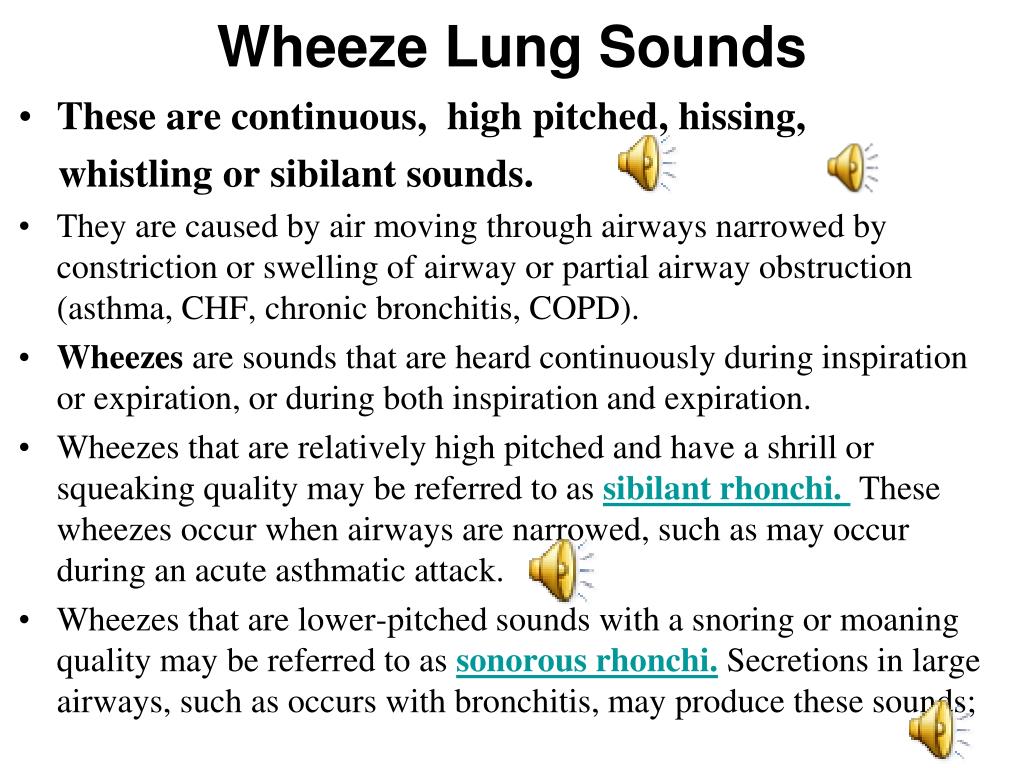

Of respiration be extreme, there is generally an increase in frequency of the pulse, The pulse and circulation are sometimes totally unaffected but if the difficulty Upon examination, the matter expectorated is found to consist merely of a thin, glairy There is sometimes a certain amount of expectoration in nervous asthma, but not always.
Sibilant rhonchi lung sounds free#
Often so slight as to be evidently due to an effort made by the patient to free hisĬhest from the difficulty of respiration. Very much in different attacks of the disease, and in different individuals, and is Sometimes violent, and may generally be known by its peculiar intonation. The cough in cases of asthma is also to a certain extent peculiar. Rise to a dry sound, the moist rhonchi occurring only when there is some liquid secreted. Some of these rhonchi are always produced in every paroxysm ofĪsthma, being caused by the swelling of the mucous membrane, which of course gives With the mucous - that is, the liquid is secreted in the smaller tubes, which of course Is much liquid secretion there is a sub-crepitant rhonchus heard at the same time Rhonchus, both in inspiration and expiration not fixed in any portion of the chest,Īlmost as soon as they appear, some trace of mucous rhonchus may also be heard, generallyĪt the base of the lungs sometimes, however, there is little or no liquid in theĬhest, and the sounds are limited to the sonorous and sibilant rhonchi. This is at first the sonorous or sibilant More or less rhonchus to be heard in the chest. Of breathing continues for a certain time, a few hours, for example, there is always The rhonchi and other signs of bronchial irritation are heard if theĪttack is accidentally complicated with acute bronchitis. Is occasionally heard at a distance from the patient, is produced almost exclusively

Sound is feeble, but at first there is generally no rhonchus the wheezing, which If the respiration be examined, the inspiratory No decided signs of bronchial inflammation. 490.Īll who are affected with the disease are liable to sudden and violent paroxysms ofĭyspnea, or to slighter derangement of the respiration at the same time there are The inflammation to the contiguous air-cells. To sag to the dependent parts and induce dilatation of the tubes with extension of In oldĪge the bronchial mucosa is less capable of expelling the mucus, which is more apt Similar dangers if the process extends from the larger to the smaller tubes. Rales are subcrepitant and numerous and there may be areas of defective resonanceĪnd of feeble or distant tubular breathing. This extension is indicated by changes in physical signs. In measles and whooping-cough, the ordinaryīronchial catarrh is very apt to descend to the finer tubes, which become dilatedĪnd plugged with muco-pus, inducing areas of collapse, and finally broncho-pneumonia. Is in the extension of the process downward. Week or ten days convalescence is fully established.

In healthyĪdults, by the end of a week the fever subsides and the cough loosens. The course of the disease depends on the conditions under which it develops. Membranes and the greater abundance of the secretion, the rales change and become They are veryĬhangeable, and appear and disappear with coughing. In the early stage, piping sibilant rales are everywhere to be heard. On palpation the bronchial fremitus may often be felt. However, in which the breathing is rapid and when the smaller tubes are involved there The respiratory movementsĪre not greatly increased in frequency unless the fever is high. Grains, while others have undergone the myelin degeneration. The sputum is made up largely of pus-cells, withĪ variable number of the large round alveolar cells, many of which contain carbon With the loosening of theĬough great relief is a experienced. At first the cough is dry, but in a few days the secretionīecomes muco-purulent and abundant, and finally purulent. It comes on in paroxysms which rack andĭuring severe spells the pain may be very intense beneath the sternum and along theĪttachments of the diaphragm. The cough is rough at first, cuttingĪnd sore, and often of a ringing character. Sternum and a sensation of oppression in the chest. The bronchial symptoms set in with a feeling of tightness and rawness beneath the There is scarcely any fever, but in severer forms the range is from 101 o to 103 o. Oppression, with heaviness and languor and pains in the bones and back. A chill is rare, but there is invariably a sense of TheĬoryza extends to the tubes, and may also affect the larynx, producing hoarseness, The symptoms of an ordinary “cold” accompany the onset of an acute bronchitis.


 0 kommentar(er)
0 kommentar(er)
